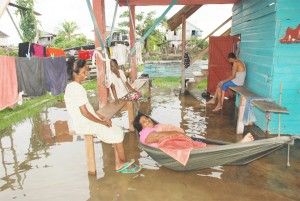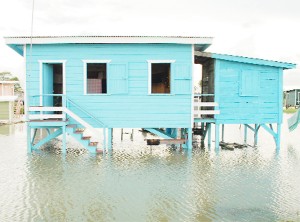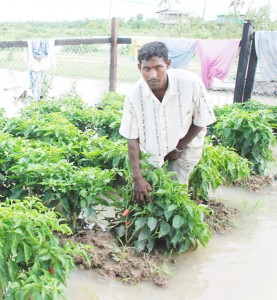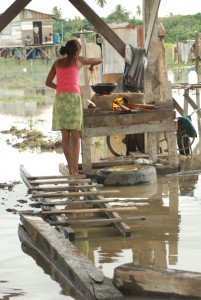By Shabna Ullah
Photos by Jules Gibson
Residents who were relocated from Joe Hook, Mahaica Creek to Hope Estate, East Coast Demerara to escape from constant flooding lost hope this week after floodwaters began destroying their crops.

The residents whose livelihood is farming were relocated in May after government provided them with house lots and while grateful for the help they told this newspaper on Thursday that “they [government] tek we out from the coffin and bring we in the grave because this whole place duck out.”

The only dry area was on a section of the street and residents who did not want their spirits to be dampened by the major losses in crops they were suffering were enjoying a game of cricket on that spot.
According to them since the heavy downpour a few days ago the water rose to several inches and barely started receding on Thursday. They said too that the area was never affected by flooding to that extent and opined that the sluice had not been operating as it should.

Chief Executive Officer (acting) of the National Drainage & Irrigation Authority (NDIA), Lionel Wordsworth said that the reason for flooding at Hope and other areas is because a resident had placed a padlock on the internal sluice in the façade drain between Victoria and Nootenzuil on the East Coast.
When this newspaper contacted him on Thursday evening he was on his way to the area to break the padlock. Further Wordsworth said that the water in all other areas had started to recede “because of the break in the weather.”
Residents said the area has a pump which has since been put into operation but they felt that it does not have the capacity to drain the amount of water fast enough.

The residents said too that an excavator had been deployed to clear the mouth of the koker at Hope after the rain started. They said that the flooding would not have been so severe had the clearing been done in preparation for the rainy season.
An official from the Ministry of Agriculture (MOA) told this newspaper that NDIA had prepared the excavator to start clearing the drains but the work had to be done in the rainy weather.
Sahadeo Achaibar told this newspaper that he was looking forward to reaping his two beds of watermelon for the first time within two days but he watched helplessly as the water covered them.
He said that he lost $200,000 in the crop and does not know what to do now; “which corner to turn. The situation worse than in the creek because we used to find other things to do like catch lil fish and so to eat and to make a dollar. But here nobody aint buying fish and we can’t find any work.”
He said he would have been able to reap a crop already if only he had the money to invest as soon as he relocated. He got temporary work with his brother-in-law from Mahaica to clean trenches and to work in rice fields.
He said after those jobs were completed he got enough money to invest in his crop. However he also spent a long time clearing the bush to plant and preparing the land that he had bought. He said government had promised to assist them with farm land but so far they have not gotten any.
Cash crop farmer, Nandram Ramesh was distressed that he had invested all his savings in two beds of bora and one bed of pepper and was expecting to make over $45,000 per week, especially for the Christmas season. He said he had reaped just a little before the floods came.
Danesh Doodnauth told this newspaper that his six acres of watermelon, cucumbers and bora were also under water. He was thankful that he got to reap a little bora twice but said that cannot compensate for the amount of money he invested.
He said he had bought watermelon seeds for $13,500 and tomato seeds for $6,300 while he paid workers $175,000 to help clear the bushy area and cultivate the land. Thinking that he would be safe from flooding, he even bought a ‘new’ chainsaw from Courts for $97,000.
“I don’t know what else to do now,” he lamented. “Only garden cultivation me know about but me gon have to try to do something. I gon walk the area to see if me can do some small farming to catch me self up till the water go down.”
Meanwhile, Deodat Persaud, a rice farmer of Gordon Table in the Mahaicony Creek said he and three other farmers would lose over 100 acres of rice because the water is too high.





